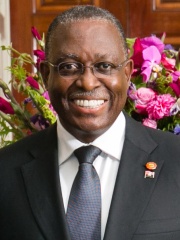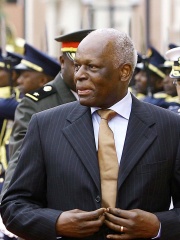
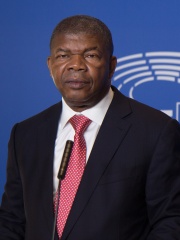
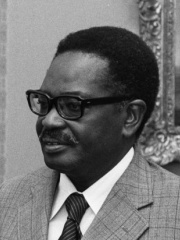
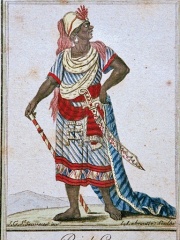
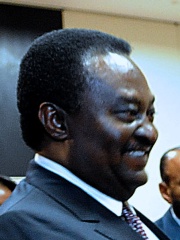

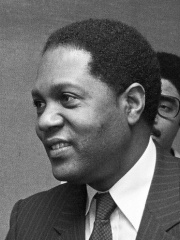
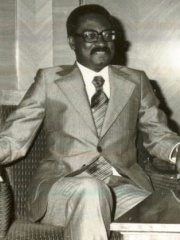
The Most Famous
POLITICIANS from Angola
This page contains a list of the greatest Angolan Politicians. The pantheon dataset contains 19,576 Politicians, 12 of which were born in Angola. This makes Angola the birth place of the 141st most number of Politicians behind Trinidad and Tobago, and Liberia.
Top 10
The following people are considered by Pantheon to be the top 10 most legendary Angolan Politicians of all time. This list of famous Angolan Politicians is sorted by HPI (Historical Popularity Index), a metric that aggregates information on a biography's online popularity. Visit the rankings page to view the entire list of Angolan Politicians.

1. José Eduardo dos Santos (1942 - 2022)
With an HPI of 73.08, José Eduardo dos Santos is the most famous Angolan Politician. His biography has been translated into 81 different languages on wikipedia.
José Eduardo Van-Dúnem dos Santos (Portuguese pronunciation: [ʒuˈzɛ eˈðwaɾðu ðuʃ ˈsɐ̃tuʃ]; 28 August 1942 – 8 July 2022) was an Angolan politician and military officer who served as the second president of Angola from 1979 to 2017. As president, dos Santos was also the commander-in-chief of the Angolan Armed Forces (FAA) and president of the People's Movement for the Liberation of Angola (MPLA), the party that has ruled Angola since it won independence in 1975. By the time he stepped down in 2017, he was the second-longest-serving president in Africa, surpassed only by Teodoro Obiang Nguema Mbasogo of Equatorial Guinea. Dos Santos joined the MPLA, then an anti-colonial movement, while still in school, and earned degrees in petroleum engineering and radar communications while studying in the Soviet Union. Following the Angolan War of Independence, Angola was constituted in 1975 as a Marxist–Leninist one-party state led by the MPLA. Dos Santos held several positions, including Minister of Foreign Affairs in the government of independent Angola's first president, Agostinho Neto. After Neto's death in 1979, dos Santos was elected by the MPLA as the country's new president, supported by the Soviet Union and inheriting a civil war against Western-backed anti-communist rebels, most notably UNITA. By 1991, his government agreed with rebels to introduce a multi-party system, while changing the MPLA's ideology from communism to social democracy. He was elected president in the 1992 Angolan general election over UNITA leader Jonas Savimbi, and presided over free-market economic liberalisation and the development of Angola's oil sector. In 1997, he contributed to a rebel invasion of neighboring Zaire during the First Congo War, leading to the overthrow of Congolese UNITA ally Mobutu Sese Seko and the installation of Laurent-Désiré Kabila as President of the Democratic Republic of the Congo later that year. During the Second Congo War from 1998 to 2003, he supported Kabila's government and later that of his son Joseph against several rebel groups loosely allied with UNITA. The MPLA achieved victory in the civil war by 2002 following Savimbi's death. After winning a second presidential term in the 2012 election, he retired from the presidency in 2017, succeeded by party-mate João Lourenço as president. A controversial figure, dos Santos received many international awards for his commitment to anti-colonialism and promotion of peace negotiations with rebels to end wars, and was praised for attracting significant foreign investment to Angola's economy. He was criticised as having been a dictator and was accused of creating one of the most corrupt regimes in Africa, with a deeply-entrenched patronage network.

2. João Lourenço (b. 1954)
With an HPI of 71.88, João Lourenço is the 2nd most famous Angolan Politician. His biography has been translated into 60 different languages.
João Manuel Gonçalves Lourenço (Portuguese pronunciation: [ˈʒwɐ̃w̃ mɐˈnwɛl ɡõˈsal.vɨʒ lo(w)ˈɾẽsu]; born 5 March 1954) is an Angolan politician who is currently serving as the third president of Angola since 26 September 2017. Previously, he was the minister of defence from 2014 to 2017. In September 2018, he became the chairman of the People's Movement for the Liberation of Angola (MPLA), the ruling party. He was the party's secretary-general from 1998 to 2003. João Lourenço was designated in December 2016 to occupy the party's number one position in the August 2017 legislative election. In terms of the 2010 constitution, "the individual heading the national list of the political party or coalition of political parties which receives the most votes in general elections ... shall be elected President of the Republic and Head of the Executive" (Article 109). As the MPLA won a majority of 150 seats, Lourenço automatically became President of Angola, succeeding José Eduardo dos Santos, who had been in power for 38 years. Lourenço was officially sworn into office on 26 September 2017.

3. Agostinho Neto (1922 - 1979)
With an HPI of 71.58, Agostinho Neto is the 3rd most famous Angolan Politician. His biography has been translated into 65 different languages.
António Agostinho Neto Kilamba (17 September 1922 – 10 September 1979) was an Angolan communist politician and poet. He served as the first president of Angola from 1975 to 1979, having led the Popular Movement for the Liberation of Angola (MPLA) in the war for independence (1961–1974). Until his death, he led the MPLA in the civil war (1975–2002). Known also for his literary activities, he is considered Angola's preeminent poet. His birthday is celebrated as National Heroes' Day, a public holiday in Angola.

4. Afonso I of Kongo (1456 - 1543)
With an HPI of 67.73, Afonso I of Kongo is the 4th most famous Angolan Politician. His biography has been translated into 22 different languages.
Mvemba a Nzinga, Nzinga Mbemba, Funsu Nzinga Mvemba or Dom Alfonso (c. 1456 – 1542 or 1543), also known as King Afonso I, was the sixth ruler of the Kingdom of Kongo from the Lukeni kanda dynasty and ruled in the first half of the 16th century. He reigned over the Kongo Empire from 1509 to late 1542 or 1543. Born into the ruling house of House of Kilukeni, Afonso was the son of Nzinga a Nkuwu (Christianized as João I), king of the Kongo. Given political power from a young age, Afonso ruled the province of Nsundi during his father's reign. In an era of increasing relations with the Kingdom of Portugal, Afonso became a fervent convert to Catholicism and sought to embrace Portuguese institutions in his lands. Following the death of his father in 1506, Afonso prevailed in brief civil war against his brother, becoming the sixth king of Kongo. As king, Afonso centralized governmental power in his capital city at Mbanza Kongo, curtailed the power of the Kongolese nobility, and expanded the kingdom's borders through war. Unlike previous Kongolese kings, he remained a Catholic throughout his life, and worked aggressively to convert his kingdom to Christianity. His reign saw increasing cultural, economic, and religious exchanges between Kongo and Portugal, including an expansion of the Atlantic slave trade. Afonso grew more cautious of Portuguese influence in his later reign, but relations between Kongo and Portugal remained close, with both kingdoms collaborating in war and trade. Keenly interested in diplomacy, Afonso sent Kongolese embassies to Lisbon, Rome, and wrote correspondence with political and religious leaders in Europe. He was succeeded by his son, Pedro I, in either 1542 or 1543. Afonso is remembered for increasing the power of the Kongolese monarchy, his efforts to convert Kongo to Christianity, and his economic and military expansion of the kingdom.
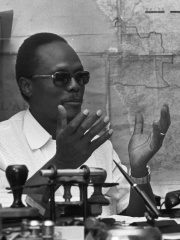
5. Holden Roberto (1923 - 2007)
With an HPI of 60.58, Holden Roberto is the 5th most famous Angolan Politician. His biography has been translated into 24 different languages.
Álvaro Holden Necaca Roberto Diasiwa (Angolan Portuguese pronunciation: [ˈal.va.ɾu ˈolden ɾoˈbeʁtu]; January 12, 1923 – August 2, 2007) was an Angolan politician who founded and led the National Liberation Front of Angola (FNLA) from 1962 to 1999.

6. Fernando da Piedade Dias dos Santos (1950 - 2025)
With an HPI of 59.88, Fernando da Piedade Dias dos Santos is the 6th most famous Angolan Politician. His biography has been translated into 31 different languages.
Fernando da Piedade Dias dos Santos (5 March 1950 – 18 December 2025), known as Nandó, was an Angolan politician who was the first vice president of Angola from February 2010 to September 2012. He was the prime minister of Angola from 2002 to 2008 and president of the National Assembly of Angola from 2008 to 2010. He again served as president of the National Assembly from 2012 to 2022.

7. Lúcio Lara (1929 - 2016)
With an HPI of 58.04, Lúcio Lara is the 7th most famous Angolan Politician. His biography has been translated into 18 different languages.
Lúcio Rodrigo Leite Barreto de Lara (9 April 1929 – 27 February 2016), also known by the pseudonym Tchiweka, was an Angolan revolutionary, physicist-mathematician, politician, anti-colonial ideologist and one of the founding members (and president) of the Popular Movement for the Liberation of Angola (MPLA). He served as General Secretary of the MPLA during the Angolan War of Independence and Angolan Civil War. Lara, a founding member of the MPLA, led the first MPLA members into Luanda on 8 November 1974. He swore in Agostinho Neto as the first president of the country. He was acting president of Angola for ten days, from 10 September 1979 to 20 September 1979, briefly leading the country between the death of Agostinho Neto and the inauguration of José Eduardo dos Santos. He was a member of the Angolan parliament from independence until 2003. He was the main ideologist and thinker of Angola's self-determination, as well as an important theorist of Marxism, being one of the biggest names in the country in the 20th century.

8. Fernando José de França Dias Van-Dúnem (1934 - 2024)
With an HPI of 56.53, Fernando José de França Dias Van-Dúnem is the 8th most famous Angolan Politician. His biography has been translated into 20 different languages.
Fernando José de França Dias Van-Dúnem (24 August 1934 – 12 June 2024) was an Angolan politician who was the First Vice-President of the African Union's Pan-African Parliament. He was a member of the ruling Popular Movement for the Liberation of Angola (MPLA) and served as Prime Minister of Angola twice during the 1990s. Dias Van-Dúnem was Prime Minister from June 1991 until December 1992 and was the first Prime Minister appointed since the post was abolished in 1978. After four years out of office, Dias was reappointed Prime Minister on 3 June 1996 and remained in office until a cabinet reshuffle in January 1999, when the post of Prime Minister was again eliminated.

9. Lopo do Nascimento (b. 1942)
With an HPI of 53.72, Lopo do Nascimento is the 9th most famous Angolan Politician. His biography has been translated into 17 different languages.
Lopo Fortunato Ferreira do Nascimento (born 10 July 1942) is an Angolan retired politician. He served as the first Prime Minister of Angola from 11 November 1975 to 9 December 1978 and was Secretary-General of the Popular Movement for the Liberation of Angola (MPLA). At the age of 19, he was arrested but released with the obligation to move to Cuanza Norte. He continued in underground fighting and was arrested again in 1963. This time he went to court and was convicted. He was detained for six years in the Luanda civil prison under Portuguese administration where he was tortured and during interrogations he spent three to five days without sleep, always on his feet; after a few days, Lopo felt that his feet would almost explode and that a person would still start talking. He didn't speak. In January 1969 he left and joined the Nocal brewery. He went to Algeria, via Lisbon, at the end of 1973. He left Angola because the MPLA had many problems, especially with the Daniel Chipenda East Revolt, and they asked him to go reinforce the leadership work. Nascimento was later Minister of Territorial Administration; after resigning from that post, he was replaced by Paulo Kassoma on 9 April 1992. He was elected as MPLA Secretary-General by the party's Central Committee in 1993. He was the 66th candidate on the MPLA's national list in the September 2008 legislative election. He won a seat in that election, in which MPLA won an overwhelming majority in the National Assembly. On 27 January 2013 he announced his retirement from active politics. On February 10, 2021, he was hospitalized for COVID-19. He subsequently recovered from the illness.
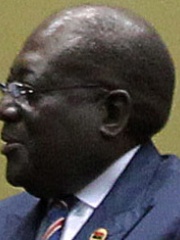
10. Paulo Kassoma (b. 1951)
With an HPI of 53.38, Paulo Kassoma is the 10th most famous Angolan Politician. His biography has been translated into 20 different languages.
António Paulo Kassoma (born 6 June 1951) is an Angolan politician. He was named Prime Minister of Angola in September 2008 and remained in office until the new constitution replaced this function in February 2010. Kassoma then served as President of the National Assembly of Angola from 2010 to 2012. On August 27, 2016 Kassoma was named Party Secretary of the People's Movement for the Liberation of Angola.
People
Pantheon has 12 people classified as Angolan politicians born between 1456 and 1956. Of these 12, 5 (41.67%) of them are still alive today. The most famous living Angolan politicians include João Lourenço, Lopo do Nascimento, and Paulo Kassoma. The most famous deceased Angolan politicians include José Eduardo dos Santos, Agostinho Neto, and Afonso I of Kongo.
Living Angolan Politicians
Go to all RankingsJoão Lourenço
1954 - Present
HPI: 71.88
Lopo do Nascimento
1942 - Present
HPI: 53.72
Paulo Kassoma
1951 - Present
HPI: 53.38
Manuel Vicente
1956 - Present
HPI: 49.96
Marcolino Moco
1953 - Present
HPI: 49.82
Deceased Angolan Politicians
Go to all RankingsJosé Eduardo dos Santos
1942 - 2022
HPI: 73.08
Agostinho Neto
1922 - 1979
HPI: 71.58
Afonso I of Kongo
1456 - 1543
HPI: 67.73
Holden Roberto
1923 - 2007
HPI: 60.58
Fernando da Piedade Dias dos Santos
1950 - 2025
HPI: 59.88
Lúcio Lara
1929 - 2016
HPI: 58.04
Fernando José de França Dias Van-Dúnem
1934 - 2024
HPI: 56.53
Overlapping Lives
Which Politicians were alive at the same time? This visualization shows the lifespans of the 6 most globally memorable Politicians since 1700.

